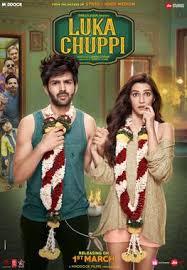Some films are made for pure entertainment, and this one fits that bill perfectly. Starring Kartik Aaryan and Kriti Sanon, it is set in the small town of Mathura, India, and falls into the romantic comedy genre. The film, directed by Laxman Utekar, explores the trials and tribulations of modern-day relationships within the context of India’s small-town conservatism. What sets it apart from typical rom-coms is its take on the issue of live-in relationships, a controversial topic in traditional Indian society.
The story revolves around Guddu, a reporter working for a local TV channel, and Rashmi, a strong-willed girl who is clear about what she wants from life. When they fall in love, instead of opting for a traditional marriage, they decide to try living together first. However, the situation becomes complicated when Guddu’s family and the entire town mistakenly assume they are already married. This leads to a series of comedic misunderstandings and lies that they must navigate to keep up the facade. The film cleverly highlights how societal expectations and family pressures can complicate what should be a simple relationship decision.
One standout aspect of the movie is its casting. Kartik, who plays Guddu, brings his signature charm and boy-next-door appeal to the role. He excels in portraying the character’s confusion and frustration as he struggles to juggle love, family, and society’s demands. His impeccable comic timing, especially in scenes where he tries to keep the charade of marriage alive, is spot-on. Kriti, as Rashmi, shines with her confident screen presence. She portrays a modern, independent woman who is ready to take control of her life, yet is grounded enough to be likable. Her chemistry with Kartik is palpable, and the two lead the film with ease, making the audience root for their unconventional love story.
The direction by Laxman is another strong point. He manages to balance the lighthearted comedy with underlying social commentary, without making the film too preachy. He uses the setting of a small Indian town not just as a backdrop but as a character in itself. The way he incorporates the small-town mentality and the constant nosiness of neighbors and relatives adds layers to the narrative. One particularly funny sequence involves Guddu’s extended family staying under the same roof, which heightens the absurdity of their situation. The director successfully captures the complexities of small-town life while delivering plenty of laugh-out-loud moments.
The cinematography by Milind Jog plays an integral role in creating the vibrant, colorful world of Mathura. From narrow lanes lined with vendors to sprawling homes packed with relatives, every scene is carefully designed to immerse the viewer in the town’s bustling life. The camera work during the outdoor sequences, especially the song montages, is breezy and adds to the film’s energetic pace. The lively setting complements the lighthearted nature of the film, adding visual charm to the narrative.
Musically, the film boasts an upbeat soundtrack that blends well with its storyline. Songs like “Coca Cola” and “Photo” are peppy, and their picturization keeps the energy of the film flowing. These tracks, while not groundbreaking, do what they are meant to—entertain the audience and complement the light and fun vibe of the story. The background score also helps in accentuating the humor and the awkward situations Guddu and Rashmi often find themselves in.
Costume design in the film deserves a mention as well. The characters are dressed in everyday, relatable outfits that enhance their small-town persona. Guddu’s simple kurta-pajamas and Rashmi’s mix of traditional and western clothing choices effectively reflect their personalities. The film’s art direction, particularly in decorating the homes and streets of Mathura, gives an authentic feel to the setting, making the audience feel like they are part of the characters’ world.
Editing is crisp and ensures that the narrative doesn’t lose its pace. The film clocks in at around two hours and maintains a steady flow of humor and romance without overstaying its welcome. The comedic timing of certain sequences is heightened by sharp editing, especially during scenes where misunderstandings escalate, keeping the audience engaged.
However, the film does come with a few drawbacks. Its reliance on certain tropes, like exaggerated family interference and comedic misunderstandings, may feel overdone to some viewers. While the plot is engaging, it does not break any new ground. The second half, in particular, could have used more depth in terms of exploring the relationship between Guddu and Rashmi, instead of relying solely on situational comedy. There are moments where the film teeters on predictability, but the performances and humor manage to keep it entertaining.
Overall, this movie is an enjoyable watch, especially for those who appreciate lighthearted romantic comedies with a social twist. The chemistry between the leads, combined with strong direction and a lively setting, makes it a fun, breezy watch. It may not offer deep insights into relationships or challenge societal norms in any revolutionary way, but it handles its subject matter with humor and heart. If you’re looking for a feel-good film that touches upon the modern dilemmas of love and family in a conservative society, this one comes highly recommended.







